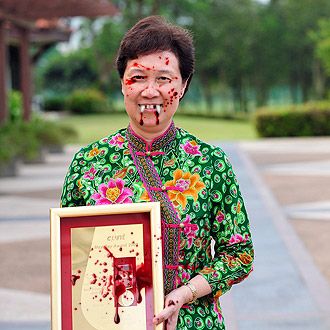<TABLE border=0 cellSpacing=0 cellPadding=0 width="100%"><TBODY><TR>Elder abuse cases 'may rise with the recession'
</TR><!-- headline one : end --><TR>Most common are physical abuse and neglect; financial abuse also on the rise </TR><!-- Author --><TR><TD class="padlrt8 georgia11 darkgrey bold" colSpan=2>By Mavis Toh
</TD></TR><!-- show image if available --><TR vAlign=bottom><TD width=330>

</TD><TD width=10>
 </TD><TD vAlign=bottom>
</TD><TD vAlign=bottom>

In a downturn, struggling couples with young children might neglect the needs of elderly family members, including their medical and basic needs. -- ST PHOTO: NG SOR LUAN
</TD></TR></TBODY></TABLE>
<!-- START OF : div id="storytext"--><!-- more than 4 paragraphs -->Madam G.H. Teo has four children but wishes she had none.
The 79-year-old widow, who used to work as a seamstress, lives in a one-room flat in the Outram area and survives on the little that is left of her savings.
<TABLE width=200 align=left valign="top"><TBODY><TR><TD class=padr8><!-- Vodcast --><!-- Background Story --><STYLE type=text/css> #related .quote {background-color:#E7F7FF; padding:8px;margin:0px 0px 5px 0px;} #related .quote .headline {font-family: Verdana, Arial, Helvetica, sans-serif; font-size:10px;font-weight:bold; border-bottom:3px double #007BFF; color:#036; text-transform:uppercase; padding-bottom:5px;} #related .quote .text {font-size:11px;color:#036;padding:5px 0px;} </STYLE><Easy targets
'When people are under pressure and financially strapped, there is a higher chance they will neglect the elderly...I've seen many instances where children siphon off parents' money in joint accounts. This is getting more rampant.'
MS HELEN KO, executive director of the Centre For Seniors
</TD></TR></TBODY></TABLE>In May last year, she found her 48-year-old drug addict son milking her savings from a joint account. When confronted, he threw a stool at her.
He still comes back to ask for money, but her other children have not visited her in two years.
Madam Teo is a victim of neglect, and physical and financial abuse.
Help groups for the elderly worry that with the recession, such elder abuse cases will rise.
In a downturn, struggling couples with young children might neglect the needs of elderly family members, including medical and basic needs.
Ms Helen Ko, executive director of the Centre For Seniors, said: 'When people are under pressure and financially strapped, there is a higher chance they will neglect the elderly.'
Mr Wong Lit Shoon, chief executive of the Singapore Action Group of Elders Counselling Centre, said calls to the centre were down by about 1,000 last year, compared to the more than 7,000 calls it received in 2007.
Callers request medical aid as well as report abuse.
In the case of alleged abuse, Mr Wong believes such calls are down because more adult children of the elderly have been retrenched, and are now staying home.
'Many of those who did call said they had not called earlier because their children were home and not at work,' he said. 'They might find it harder to report abuse.'
Also, experts say elder abuse is under-reported.
Last year, the Ministry of Community Development, Youth and Sports (MCYS) saw 145 reported elder abuse cases, down from 168 in 2007.
At Alexandra Hospital, its medical social workers saw 26 cases of elder abuse last year, up from 10 in 2007.
In a recent survey of 2,000 people by the Council For Third Age that examined attitudes towards ageing, only 77 per cent of respondents were prepared to be involved in caring for seniors.
Based on MCYS' statistics last year, elderly people aged 80 and above were most vulnerable to elder abuse. More than 50 per cent of the reported cases were also female. This is because females tend to live longer and are also more vocal about their problems.
The Sunday Times understands that perpetrators are usually family members, that is, spouses, children and son- or daughter-in-laws.
As for the types of abuse, the most common are neglect and physical abuse. Victims are denied basic needs such as food and medication, or are assaulted.
But increasingly, social workers are seeing more cases of financial abuse.
'I've seen many instances where children siphon off parents' money in joint accounts,' said Ms Ko. 'This is getting more rampant.'
Others were 'misled' by their children into selling their homes or transferring money into other accounts.
Medical social worker Josephine Goh from Alexandra Hospital knows of instances when families get representatives from financial institutions to take the thumbprints of elderly patients suffering from dementia, with the intention of taking the money from their bank accounts.
Besides family, there are outsiders such as friends and neighbours who befriend the old folk to rip them off.
Senior social worker Alvin Chua from voluntary welfare group Safe@Trans, the lead agency tasked by the Government to handle elder abuse cases, sees three reasons for elder abuse.
First, some adult children are unwilling to look after their aged parents because, they claim, the latter had been negligent parents.
'They saw their own actions now as retribution,' said Mr Chua.
Second, there are adult children or relatives with addiction problems such as drugs, gambling and alcohol. They may turn violent and take it out on the elderly.
Finally, caregiver stress may lead to elder abuse. These caregivers have trouble coping with the elderly, who are often with medical conditions, and in frustration, turn violent.
Ms Goh said a number of the abused elderly turning up at hospitals were soaked in urine and faeces, had bruises or were dehydrated and malnourished.
In some cases, the families could not be reached when patients were due to check out.
Getting these families to cooperate in taking back the elderly is no easy feat. Mr Chua often gets the phone slammed down on him.
Often, the children will grudgingly take on the responsibility only when cases are filed under the Maintenance of Parents Act.
Last year, there were 127 applications for maintenance of the elderly, up from 109 in 2007. In the first five months of this year, 165 inquiries have already been made.
Such elderly parents are usually unemployed and unable to pay for their medical expenses and daily needs with their depleted savings.
Besides families who are wilfully neglecting their elders, social workers are also seeing the sandwiched generation genuinely having problems coping, whether financially or time-wise.
These are often sole breadwinners juggling work, parents and children.
'Given the current family structure, it's easy for the sandwich generation to snap,' said Mr Chua. 'There's a high chance that such numbers will rise.'
To combat elder abuse, Ms Ko said building good relationships within the family is still the best prevention.
Public education is also important to alert caregivers that help is available should they feel burnt out.
While Mr Wong believes that with the greying population, the elder abuse situation could worsen, he hopes that the next 'silver cohort' will be more savvy.
'With more education, they should be smarter and more able to care for themselves,' he said.
[email protected] How do you think the issue of elder abuse can be tackled? Send your views to [email protected]
</TR><!-- headline one : end --><TR>Most common are physical abuse and neglect; financial abuse also on the rise </TR><!-- Author --><TR><TD class="padlrt8 georgia11 darkgrey bold" colSpan=2>By Mavis Toh
</TD></TR><!-- show image if available --><TR vAlign=bottom><TD width=330>

</TD><TD width=10>


In a downturn, struggling couples with young children might neglect the needs of elderly family members, including their medical and basic needs. -- ST PHOTO: NG SOR LUAN
</TD></TR></TBODY></TABLE>
<!-- START OF : div id="storytext"--><!-- more than 4 paragraphs -->Madam G.H. Teo has four children but wishes she had none.
The 79-year-old widow, who used to work as a seamstress, lives in a one-room flat in the Outram area and survives on the little that is left of her savings.
<TABLE width=200 align=left valign="top"><TBODY><TR><TD class=padr8><!-- Vodcast --><!-- Background Story --><STYLE type=text/css> #related .quote {background-color:#E7F7FF; padding:8px;margin:0px 0px 5px 0px;} #related .quote .headline {font-family: Verdana, Arial, Helvetica, sans-serif; font-size:10px;font-weight:bold; border-bottom:3px double #007BFF; color:#036; text-transform:uppercase; padding-bottom:5px;} #related .quote .text {font-size:11px;color:#036;padding:5px 0px;} </STYLE><Easy targets
'When people are under pressure and financially strapped, there is a higher chance they will neglect the elderly...I've seen many instances where children siphon off parents' money in joint accounts. This is getting more rampant.'
MS HELEN KO, executive director of the Centre For Seniors
</TD></TR></TBODY></TABLE>In May last year, she found her 48-year-old drug addict son milking her savings from a joint account. When confronted, he threw a stool at her.
He still comes back to ask for money, but her other children have not visited her in two years.
Madam Teo is a victim of neglect, and physical and financial abuse.
Help groups for the elderly worry that with the recession, such elder abuse cases will rise.
In a downturn, struggling couples with young children might neglect the needs of elderly family members, including medical and basic needs.
Ms Helen Ko, executive director of the Centre For Seniors, said: 'When people are under pressure and financially strapped, there is a higher chance they will neglect the elderly.'
Mr Wong Lit Shoon, chief executive of the Singapore Action Group of Elders Counselling Centre, said calls to the centre were down by about 1,000 last year, compared to the more than 7,000 calls it received in 2007.
Callers request medical aid as well as report abuse.
In the case of alleged abuse, Mr Wong believes such calls are down because more adult children of the elderly have been retrenched, and are now staying home.
'Many of those who did call said they had not called earlier because their children were home and not at work,' he said. 'They might find it harder to report abuse.'
Also, experts say elder abuse is under-reported.
Last year, the Ministry of Community Development, Youth and Sports (MCYS) saw 145 reported elder abuse cases, down from 168 in 2007.
At Alexandra Hospital, its medical social workers saw 26 cases of elder abuse last year, up from 10 in 2007.
In a recent survey of 2,000 people by the Council For Third Age that examined attitudes towards ageing, only 77 per cent of respondents were prepared to be involved in caring for seniors.
Based on MCYS' statistics last year, elderly people aged 80 and above were most vulnerable to elder abuse. More than 50 per cent of the reported cases were also female. This is because females tend to live longer and are also more vocal about their problems.
The Sunday Times understands that perpetrators are usually family members, that is, spouses, children and son- or daughter-in-laws.
As for the types of abuse, the most common are neglect and physical abuse. Victims are denied basic needs such as food and medication, or are assaulted.
But increasingly, social workers are seeing more cases of financial abuse.
'I've seen many instances where children siphon off parents' money in joint accounts,' said Ms Ko. 'This is getting more rampant.'
Others were 'misled' by their children into selling their homes or transferring money into other accounts.
Medical social worker Josephine Goh from Alexandra Hospital knows of instances when families get representatives from financial institutions to take the thumbprints of elderly patients suffering from dementia, with the intention of taking the money from their bank accounts.
Besides family, there are outsiders such as friends and neighbours who befriend the old folk to rip them off.
Senior social worker Alvin Chua from voluntary welfare group Safe@Trans, the lead agency tasked by the Government to handle elder abuse cases, sees three reasons for elder abuse.
First, some adult children are unwilling to look after their aged parents because, they claim, the latter had been negligent parents.
'They saw their own actions now as retribution,' said Mr Chua.
Second, there are adult children or relatives with addiction problems such as drugs, gambling and alcohol. They may turn violent and take it out on the elderly.
Finally, caregiver stress may lead to elder abuse. These caregivers have trouble coping with the elderly, who are often with medical conditions, and in frustration, turn violent.
Ms Goh said a number of the abused elderly turning up at hospitals were soaked in urine and faeces, had bruises or were dehydrated and malnourished.
In some cases, the families could not be reached when patients were due to check out.
Getting these families to cooperate in taking back the elderly is no easy feat. Mr Chua often gets the phone slammed down on him.
Often, the children will grudgingly take on the responsibility only when cases are filed under the Maintenance of Parents Act.
Last year, there were 127 applications for maintenance of the elderly, up from 109 in 2007. In the first five months of this year, 165 inquiries have already been made.
Such elderly parents are usually unemployed and unable to pay for their medical expenses and daily needs with their depleted savings.
Besides families who are wilfully neglecting their elders, social workers are also seeing the sandwiched generation genuinely having problems coping, whether financially or time-wise.
These are often sole breadwinners juggling work, parents and children.
'Given the current family structure, it's easy for the sandwich generation to snap,' said Mr Chua. 'There's a high chance that such numbers will rise.'
To combat elder abuse, Ms Ko said building good relationships within the family is still the best prevention.
Public education is also important to alert caregivers that help is available should they feel burnt out.
While Mr Wong believes that with the greying population, the elder abuse situation could worsen, he hopes that the next 'silver cohort' will be more savvy.
'With more education, they should be smarter and more able to care for themselves,' he said.
[email protected] How do you think the issue of elder abuse can be tackled? Send your views to [email protected]





